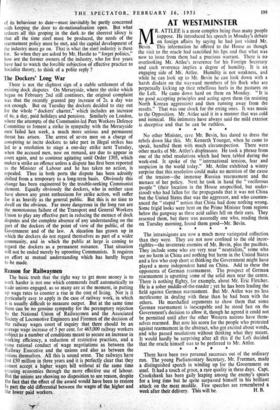AT WESTMINSTER
MR. ATTLEE is a more complex being than many people suppose. He introduced his speech in Monday's debate on foreign affairs by saying he had just visited Mr. Bevin. This information he offered to the House as though the visit to the oracle had sanctified his lips and that what was now to issue from them had a precious warrant. There is no overlooking Mr. Attlee's reverence for his Foreign Secretary and such reverence implies a degree of humility. It is an engaging side of Mr. Attlee. Humility is not weakness, and while he can look up to Mr. Sevin he can look down with a harsh disdain on the wayward members of his flock who are perpetually kicking up their rebellious heels in the pastures on the Left. He came down hard on them on Monday. "It is no good accepting principles and acting upon them (in resisting North Korean aggression) and then running away from the results." That was one shock for the erring ones. It was music to the Opposition. Mr. Attlee said it in a manner that was cold and inimical. His intimates have always said the mild exterior is deceptive and that he can be ruthless.
* * * * No other Minister, save Mr. Bevin, has dared to dress the rebels down like this. Mr. Kenneth Younger, when he came to speak, handled them with much circumspection. There were other marks of Mr. Attlee's displeasure. He took a phrase from one of the rebel resolutions which had been, tabled during the week-end. It spoke of the "international tension, fear and suspicion in the world today." Mr. Attlee exhibited a wintry surprise that this resolution could make no mention of the cause of the tension—the immense Russian Tearmament and the menace of her policy. Next he took in hand the "vociferous people" (their location in the House unspecified, but under- stood) who had fallen for the propaganda that it was not China but the United States that was the aggressor, and who counten- anced the " stupid " notion that China had done nothing wrong. Some frigid looks were bent on the Prime Minister from regions below the gangway as these acid sallies fell on their ears. They resented them, but there was assuredly one who, reading them on Tuesday morning, found them good—Mr. Bevin.
* * * * The intransigents are now a much more variegated collection than they were. They are not now confined to the old incor- rigibles—the inveterate enemies of Mr. Bevin, plus the pacifists. They include some who are very near "neutralists." some who see no harm in China and nothing but harm in the United States and a few who stop short at thinking the Government might havo played a more independent hand on China. Add to these the opponents of German rearmament. The prospect of German rearmament is upsetting some of the solid men near the centre. There is nothing flighty, for example, about Mr. Eric Fletcher. He is a sober middle-of-the-roader ; yet he has been leading the field against German rearmament. But Mr. Attlee was no less mettlesome in dealing with these than he had been with the others. He marshalled arguments to show them that some German rearmament is inescapable and he stood fast on the Government's decision to allow it, though he agreed it could not be permitted until after the other Western nations have them- selves rearmed. But note his scorn for the people who protested against rearmament in the abstract, who got excited about words, and who passed resolutions without thinking what they meant. It would hardly be surprising after all this if the Left decided that the oracle himself was to be preferred to Mr. Attlee.
* * * * There have been two personal successes out of the ordinary run. The young Parliamentary Secretary, Mr. Freeman, made a distinguished speech in winding up for the Government on steel. It had a touch of grace, a rare quality in these days. Capt. Crookshank has been gaily leaping among the enemy's spears for a long time but he quite surpassed himself in his brilliant attack on the meat muddle. Few speeches are remembered a week after their delivery. This will be. H. B.


































 Previous page
Previous page